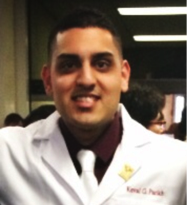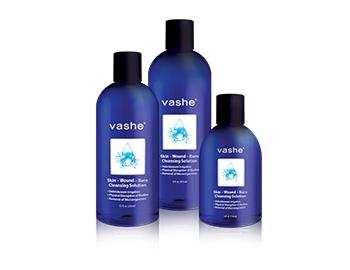Product Technology Overview: Vashe® Wound Solution by SteadMed Medical, LLC
April 2, 2015
By Keval Parikh and James McGuire DPM, PT, CPed, FAPWHc
An important aspect of the field of wound care is the proper preparation of the wound bed. Key points in wound bed preparation include minimizing exudate, assistance in the facilitation of the body’s healing process, and helping to produce a well-vascularized, stable wound that is free of microbes.1
Vashe Wound Solution Overview and Indications
Vashe® Wound Solution is an effective irrigation, moisturizing, and debridement tool that assists in the preparation of a wound bed. The chemical composition of Vashe is HOCl – hypochlorous acid. Hypochlorous acid has many uses including chronic wound care, endoscope cleansing, dermatology, cleaning air equipment, and in dental surgeries. Hypochlorous acid is an ideal wound care agent due its effectiveness as a microbicidal, its antibiofilm properties, and its role in wound healing potency. Vashe wound therapy also helps to moisten and lubricate absorbent wound dressing such as Drawtex® Hydroconductive Wound Dressing. Vashe wound solution is indicated for stage I-IV pressure ulcers, venous insufficiency ulcers, diabetic ulcers, post-surgical wounds, first- and second-degree burns, and minor abrasions of the skin.2 There are no clinical contraindications for use, because hypochlorous acid is non-cytotoxic, non-irritating, non-sensitizing, and has no oral toxicity. Its chemical properties and normal human mimicking pH make it safe for patients and the environment.
Application of Vashe Wound Solution
Proper irrigation of the wound bed and periwound area are essential for the application of Vashe Wound Solution. This allows it to remove debris and moisten the surrounding area for wound bed preparation. Cover wound bed for 3-5 minutes with dressings to allow for full saturation.
Related Studies and Results
In the Journal of Wound Care, a study was performed to evaluate the use of hypochlorous acid wash solutions in the treatment chronic venous leg ulcers.3 The study used Vashe wound solution on patients who failed to achieve a 44% reduction in wound size with standard treatment. The results showed that in 20 patients, 9 healed and 5 reduced in size by over 60%, and all patients became pain free. The results of the study showed that Vashe therapy could be used as a combination to decrease wound size and decrease levels of pain caused by venous ulcerations. A second study was preformed to investigate the effect of stabilized hypochlorous acid on the killing rate, biofilm formation, antimicrobial activity within biofilm against isolated microorganisms and migration rate of wounded fibroblasts and keratinocytes.4 The results showed that all microorganisms were killed within 0 minutes and the accurate killing time was 12 seconds. They concluded that stabilized HOCl solution has favorable effects on fibroblast and keratinocyte migration and theses features lead to HOCl being an ideal wound care agent. I have had clinical experience using Vashe on patients' wounds at Temple. Each wound is cleansed with the solution and it is ordered for our patients to use at home. If you are doing PCR testing or DNA sequencing for bacterial identification it is important to note that samples of the wound bed need to be taken before you apply Vashe as it interferes with the process. To learn more about this company and product visit http://www.woundsource.com/company/steadmed-medical-llc References: 1. Vowden K. Wound Bed Preparation. World Wide Wounds. http://www.worldwidewounds.com/2002/april/Vowden/Wound-Bed-Preparation…. Published July 17, 2002. Accessed March 7, 2015. 2. Vashe Wound Solution. SteadMed Medical. http://www.steadmed.com/product-wound-therapy-vashe-wound-therapy-solut…. Accessed March 7, 2015. 3. Selkon JB, Cherry GW, Wilson JM, and Hughes MA. Evaluation of hypochlorous acid washes in the treatment of chronic venous leg ulcers. Journal of Wound Care.2006;15(1):33-7. 4. Sakarya S, Gunay N, Karakulak M, Ozturk B, and Ertugrul B. Hypochlorous Acid: An Ideal Wound Care Agent with Powerful Microbicidal, Antibiofilm, and Wound Healing Potency. Wounds 2014;26(12):342-50.
About the Authors:
 Keval Parikh is a third year podiatric medical student at Temple University in Philadelphia, PA. Keval graduated from Rutgers University in New Brunswick, NJ with a degree in Cell biology and Neuroscience. Keval wanted to broaden his education and took on a minor in Philosophy, which would teach him about the ethics and morals of making decisions. Dr. James McGuire is the director of the Leonard S. Abrams Center for Advanced Wound Healing and an associate professor of the Department of Podiatric Medicine and Orthopedics at the Temple University School of Podiatric Medicine in Philadelphia.
Keval Parikh is a third year podiatric medical student at Temple University in Philadelphia, PA. Keval graduated from Rutgers University in New Brunswick, NJ with a degree in Cell biology and Neuroscience. Keval wanted to broaden his education and took on a minor in Philosophy, which would teach him about the ethics and morals of making decisions. Dr. James McGuire is the director of the Leonard S. Abrams Center for Advanced Wound Healing and an associate professor of the Department of Podiatric Medicine and Orthopedics at the Temple University School of Podiatric Medicine in Philadelphia.
The views and opinions expressed in this blog are solely those of the author, and do not represent the views of WoundSource, HMP Global, its affiliates, or subsidiary companies.
Have a product to submit?
Be included in the most comprehensive wound care products directory
and online database.
Learn More









